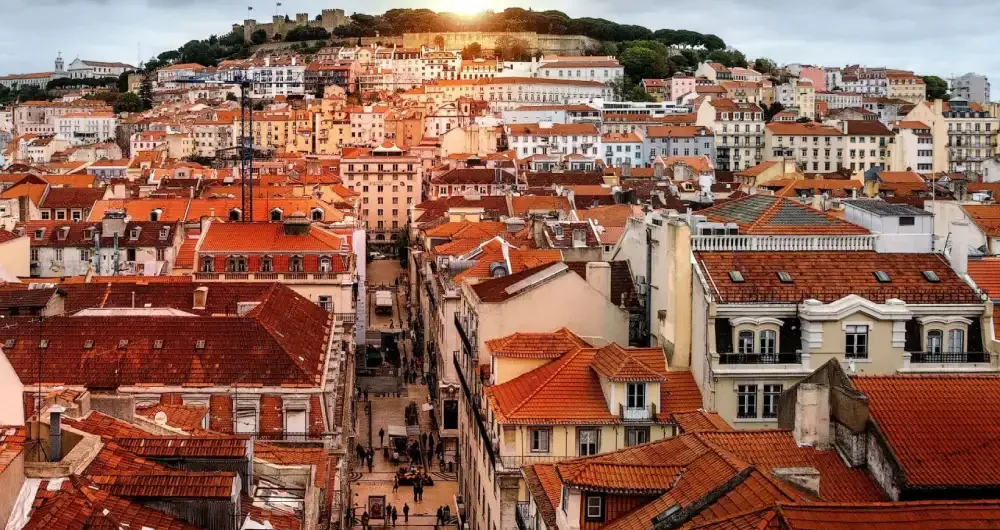It is not without a reason that Lisbon is called the ‘city of light’. With an approximate 220 days of sunlight, its wide skies and open brightness illuminate the whole city in a way that is nearly impossible to find anywhere else. Experience a city like no other and let yourself be swept off your feet by the many quirks and charms of the capital city of Portugal.
-
Where is Lisbon?
Situated in the central line of the country, Lisbon is well-known to be the home of the westernmost point in continental Europe, the Cabo da Roca. Crossed by the river Tagus, the city is surrounded by water as the river’s estuary opens into the wide Atlantic Ocean.
-
Origins and Foundation
With a history that comprises a myriad of cultures, the city of Lisbon is vast in its variety that allows for its cosmopolitan ambience. From its name to its architectural style, the Portuguese capital combines its history into its atmosphere – and influences stemming from the early Iberians to the Roman Empire, and more prominently the Moorish can be seen throughout the city. Lisbon was under the dominion of the aforementioned people until the year of 1147, where the country’s first king, D. Afonso Henriques led the crusades to recover the area. Despite the national siege, the roots of the city of Lisbon remained in its past history, beautifully conjoining with the Portuguese styles that were to follow – giving its history and ambience a unique flair that can still be observed to this day.
-
The Discoveries
The country of Portugal would not be the same were it not for its active presence in the discovery of the ‘New World’. The country’s access to the sea is incomparable to any other country in Europe – and Portuguese ancestors used their vast knowledge of the ocean to their advantage. The purpose of the discoveries movement surged from darker ages – as the end of the 14th century was plagued with disease, crisis and unemployment. The sea thus became the Portuguese people’s source of sustenance, both in the areas of fishing and commerce. As the people accustomed themselves with maritime skills, curiosity began to arise as to what could be found beyond their area of knowledge. In the early 1400’s, the king allowed for the first explorations to take part – and from there, the Portuguese people formed a bond with the sea. The conquest of the African shore, commenced with the discovery of Ceuta incited the Portuguese desire to discover what was beyond. Following the islands of Madeira, Azores and the African coast, the explorers sought to discover the Indian ocean – and through it, they came upon two of Portugal’s most influencing colonies, India and Brazil.
The Discoveries movement put the small country of Portugal on the map, and even to this day, the events shaped Portuguese culture. While the country has lost the previous glory it once held, the people still hold onto a nostalgic past that narrates tales of a land who once held half of the world.
-
The Earthquake
A critical event that reshaped Portuguese, and especially Lisboan history, was the 1755 earthquake. Quite literally, the disastrous event incited the full reconstruction of the capital city – so much that architectural structures are now classified as before and after the earthquake.
Albeit unpredictable and unstoppable, the earthquake was understandably a vision of Armageddon for the inhabitants of the city of Lisbon. On the 1st of November 1755, ironically the day pronounced All Saints’ Day by the Catholic church, Lisbon was stopped by an eight-minute seism that brought the city to ruins. Tragically, it was then followed by a tsunami that extended to the famous Lisbon downtown, consuming the areas of Terreiro do Paço and the Comércio Square, before known as the Royal Ribeira Palace – the main residence of Portuguese regency. The little that survived the earthquake and tsunami was subsequently destroyed by a fire that overtook the city, attacking churches in particular – as they were filled with candles due to the religious holiday. The earthquake was named one of the deadliest in history, with its repercussions extending across Spain and Morocco, with shocks felt throughout the rest of Europe and Northern Africa.
-
Modern Lisbon
The subsequence of the earthquake started what can now be regarded as the early beginnings of modern Lisbon. Despite a century-long monarchy coming to an end in the early 20th century due to a regicide that assassinated the king and its descendants, cultural Lisbon as we know it began to grow. With the propagation of Fado through the city, the tradition of bull fighting (that still happens to this day at the Campo Pequeno bullring) being re-established and the resurgence of Portuguese theatre, the city was blooming until the complications of an early republic caused it to halt. For a number of decades Portugal was under unstable government, until it was overtaken by fascist dictator Salazar. During four decades, Portugal closed itself to international influence. Despite its tyrannical approach to anyone who contested the system, the Salazar government did bring a number of advantages to the city of Lisbon – such as the construction of the 25th of April bridge, that united the country from North to South. The dictatorship was inevitably overthrown in 1975, during the famous Carnation Revolution, in which the soldiers, in a plea for peace, placed red carnations on the necks of their guns. From the revolution stemmed one of the cultural symbols of both the capital city and the country alike – the ‘Gaivota’ song, that ignited the popular revolution and reinstituted the reclaiming of Portuguese culture.
Due to the recent wave of immigration of the later 20th century, Lisbon became a multinational hub, in which a myriad of languages – from European, to African, to South American and Asian – can be heard.
-
Why visit Lisbon?
Not only rich in history, the capital city of Portugal is culturally extensive and possesses an easy going charm that will unquestionably welcome you with open arms. From its narrow yet inviting streets that call you to explore, to the wonderful gastronomy that bears a homemade-like genuineness, to the buzzing bar-hopping based nightlife that will make you want to stay up until the wee hours of the morning – Lisbon is an experience not to be missed. Allow yourself to be embraced by true Portuguese Lisboan culture, and to hopefully be charmed enough to want to return.






